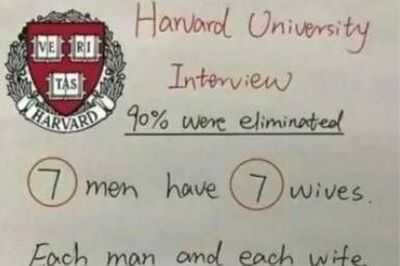
A 'impossible' Harvard brainteaserhas stumped 90% of people who attempt to solve it.
The puzzledisplays the renowned US university's letterhead alongside a challenging maths problem written in red and black ink. It poses: "If there are seven men with seven wives and each man and each wife have seven children, what is the total number of people?"
The riddleis tricky enough on its own, but it baffles people even more because it yields two different solutions. The conundrum surfaced online in 2021, but has resurfaced and confounded fresh challengers who each arrived at varying answers. Responses ranged from 21 individuals to as many as 448.
READ MORE: Only people with 'sniper vision' can spot sneaky detail among gravel and stones
READ MORE: Prove you have 'eyes of a hunter' by spotting fox in pile of autumn leaves
Remarkably, one person suggested the figure could be even higher at 700 people, though offered no explanation for how this number was calculated. "This is all word play" remarked one participant. "There are several answers and not one is wrong unless you don't get the math right."
The matter of question interpretation arose once more as people debated whether each man has one wife, making the correct answer 63. However, if each man has seven wives, the solution becomes 392.
Another contributor noted: "This is ambiguous, which I guess is the point 'But let's assume that there are just seven couples (seven men and seven wives), which equals 14 people. Each couple had seven kids, so that is 7x7=49 kids. Add 'em up and it is 63 people."
The debate raged on, based on the assumption that each bloke had seven wives. Some folks reckoned you could reach 399 people by multiplying seven by seven to get 49 wives and adding that to seven men.
READ MORE: Brainteaser shows whether you're 'stressed or calm' based on how you see image
But if each of the 49 wives has seven kids, that's 343, and if each man has seven kids, that's another 49, totalling 392 people. These mathematical conundrums are crucial as they push us to scrutinise information and consider answers from various perspectives.
They show how we break down problems into smaller, more manageable chunks and whether we employ creative thinking. But if you were one of the many who got it wrong, don't worry, you're in good company. The puzzle, which has resurfaced, is said to have originated from Harvard Universityin the US.
Earlier, the Mirror reported on another brainteaser that left people scratching their heads, challenging them to figure out the next number in a truly perplexing sequence. Giving your brain a workout is beneficial because it can help enhance cognitive function and improve mental sharpness.
Doing brain teasers also helps ward off long-term health conditions like dementia as we age, allowing us to keep our cognitive parts of our brain in check.